The C of E should apologise
Sir: Peter Hitchens’s article on the allegations against the late Bishop Bell is a welcome intervention in a sorry affair (‘Justice for Bishop Bell’, 7 November). If the best evidence against Bishop Bell was sufficient only to merit his arrest (were he alive), then the recent statements concerning him issued by the church authorities should be withdrawn; if they have better evidence, then that should be published.
It should not be forgotten that this is not the first time this year that senior figures in the Church of England have made dubious accusations of child abuse against the dead. Earlier this year the Bishop of Durham saw fit to announce that he had passed to the police the names of Lord Whitelaw and Enoch Powell as suspects in child abuse cases. No evidence has ever emerged to support these claims. Nevertheless, the Bishop of Durham has not yet apologised to the Whitelaw and Powell families for any distress he may have caused them.
The Church of England was once able to boast bishops with the moral stature of George Bell; now it seems to produce only mitred Tom Watsons.
Colin Armstrong
Belfast
No obligations to Ukraine
Sir: I do not often disagree with Con Coughlin, and I agree with most of what he says about our defence policy and priorities (‘An indefensible truth’, 7 November). But he is wrong when he writes about our sending ‘100 or so military advisers to Kiev to help train government forces’. We have no obligations to Ukraine at all, and we have no business to be sending any troops there. Ukraine is not a member of Nato or the EU, and if we persist then we can hardly object if Putin sends 75 or 100 advisers to Scotland on the invitation of Nicola Sturgeon or Alex Salmond — which is quite possible. The situation is different in Poland and the Baltic states: they are our allies.
Chris Minter
London SW6
Unconventional threats
Sir: Con Coughlin confuses size with effect in his analysis of our military needs. The examples of Iraq, Afghanistan, Libya were all effective in their offensive phase, but failures in creating peace. To talk of boots on the ground is to fight yesterday’s wars.
The lesson of our 21st-century adventures is that offence is not the issue — rebuilding is. We should recognise that only Russia and China could present feasible threats to our nation’s security of the sort that would require conventional defence. Most coming threats are not conventional. They are communications-led, remote and singular in their delivery. Perhaps GCHQ should be treated as our ‘Queen Elizabeth Class’ defence platform.
Mark Bexon
Lewes, East Sussex
Poets, not luvvies
Sir: I enjoyed James Delingpole’s mockery of our omniscient luvvies (7 November). But Coleridge and Wordsworth ‘luvvies’? Coleridge was a poet, metaphysical philosopher, sage and sometime political adviser to the governor of Malta. Wordsworth was, at the least, a half-decent poet. A step up from today’s narcissistics.
Revd Dr Peter Mullen
Eastbourne, East Sussex
Is ‘creativity’ necessary?
Sir: Nicholas Serota (Letters, 7 November) argues about the importance of ‘creativity’ in education. His view appears to be echoed by the headmaster of Eton; but is creativity a necessary part of a child’s education? Jacques Barzun, the French intellectual and polymath, would have found this idea lamentable. His book House of Intellect provides an excellent analysis of the state of modern education, describing the alarming lack of intellectual rigour in schools, as the focus has shifted away from teaching ‘difficult’ subjects to teaching ‘softer’ ones, in which every child must be seen to succeed. The demand for excellence has all but disappeared. He wrote it in 1959.
Barrie Mitelman
Westcliff, Essex
Wow and wah
Sir: Barry Humphries deplores the abuse of the expletive ‘Wow’ (Diary, 31 October), but it is far from being a contemporary vice. The Mughal Emperor Jehangir, on his way back to Kabul in 1607, is said to have been so struck by the beauty of the ponds and waterfalls near a village on what is now the Grand Trunk Road, that he exclaimed ‘Wah’ — giving it the name that survives today.
James Blount
London W10
Vulgarians at home
Sir: Taki should delight in the fact that the ‘vulgarians’ have swimming pools, cocktail bars, gyms, cinemas and other such in their homes (High Life, 7 November). It means the vulgar rich will stay put, and he will not have to encounter them elsewhere.
Edward Windham-Bellord
Cucklington, Somerset
Grammar prize
Sir: Out of 29 attempts at my grammar test (Diary, 17 October), all of them classy by the standards of today’s general competence in grammar, a single one combined being error-free with being sufficiently exact to exclude any ambiguity. This was submitted by David Mackie, who accordingly, courtesy of The Spectator, will shortly be receiving the prize of a bottle of Pol Roger. Shortly after submitting his entry, Mr Mackie sent me an email mainly devoted to disputing one of the elaborated answers that I put on my website at the same time as I gave my ‘bare-bones’ answers in last week’s Spectator (7 November). And so interesting and well argued is what he said that I have added this email of his to the relevant page of my website (gwynneteaching.com) for the enlightenment of anyone who fancies some brain-sharpening reading.
N.M. Gwynne
Co. Wexford, Ireland
Got something to add? Join the discussion and comment below.
Get 10 issues for just $10
Subscribe to The Spectator Australia today for the next 10 magazine issues, plus full online access, for just $10.
You might disagree with half of it, but you’ll enjoy reading all of it. Try your first month for free, then just $2 a week for the remainder of your first year.













Comments
Don't miss out
Join the conversation with other Spectator Australia readers. Subscribe to leave a comment.
SUBSCRIBEAlready a subscriber? Log in